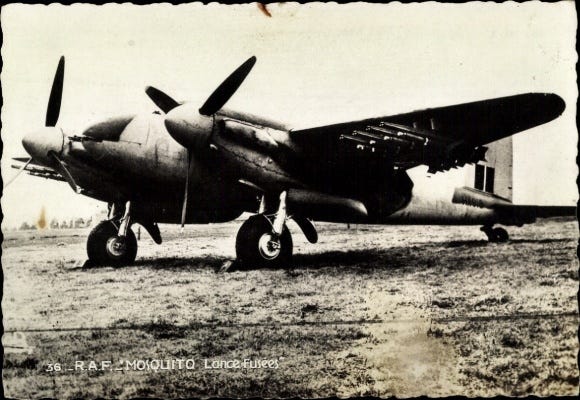
August 18 - August 23, 1942.
Summary:
Rain finally stops and the HVP Plankenhorn bunker dries out. This brings a new pest: Gnats.
The night of August 18 into the morning of August 19, a lone Mosquito bombs Hamburg. Two are dead, thirty-two wounded, thirty-one homeless.

Russian bombers step up their air raids near Ržev. TVP personnel deliver loads of wounded to the HVP. Although the operating room is filled to overflowing with casualties for the surgeons to tend to, this does not affect the five friends, as none of them is assigned to the operating room. They continue to function more as medics than as medical students doing a clinical rotation.
August 20, Adolf Hitler appoints Roland Freisler President of the Volksgericht, the People’s Court.
Friday and Saturday nights — August 21/22 — the five friends continue to grow closer. Friday night, red wine flows freely. But Saturday night, they sit with Russian friends as a nameless Russian woman who works in their camp sings songs of her homeland. Other Russian girls soon join in. Before long, the soldier students forget their soldier status and hum harmony. Will Graf tells his diary, “One can sense the heart of Russia, which we love.”
Willi has the rare opportunity to celebrate Mass on the battlefield on Sunday morning. He critiques it — the priest did not approach it with the proper heart — still happy to have gone to church.
Hans Scholl pens a long-winded treatise comparing German and Russian writers. His attempt at literary criticism falls short, revealing his immaturity. Hans asserts that Dostoevsky has suffered real pain, while Goethe was a pantywaist who had never known deprivation. He states that man can live without poets, and then lists what he deems to be the four essentials of life: Calories, vitamins, entertainment, and sexual lust.
His “treatise” underscores the Scholls’ disconnect from reality. Hans Scholl continues to praise poverty while never having missed a meal. Robert Scholl joins all the right Nazi clubs and thinks himself courageous for criticizing Hitler’s policies - while ignoring injustices. The Scholl family has never even known a soldier killed in action.
Until Sunday, August 23, 1942, when they learn that Ernst Reden has fallen on the front lines. Lisa Remppis is visiting Sophie. Magdalena Scholl interrupts their Schubert concert to tell Sophie about Ernst’s death. Sophie silently hands her sister Inge a Pieta d’Avignon portfolio.
Inge Scholl says (postwar) that Sophie then says that she must “now” do something to avenge Ernst Reden’s death.
Why this matters:
We must pay attention to low-key political announcements that do not receive a lot of press. Hitler’s appointment of Roland Freisler was a yawner. Except that Freisler’s vicious actions as judge changed the course of German “justice.”
It was not just White Rose trials on February 22 and April 19, 1943 where Freisler’s cruelty and injustice shown bright. He presided over the trials for the July 20, 1944 resistance movement as well. By one report, the death sentences handed down by Freisler alone from August 20, 1942 until his death in February 1945 exceeded the death sentences handed down by all other judges combined from 1934-1945.
Watch for the “news” that gets little traction.Be careful where you hitch your wagon. Yes, Hans Scholl was a hero. But he was not “all that,” as is seen here. Where Christoph Probst, Willi Graf, and Traute Lafrenz based their resistance on deep contemplation and true conviction, Hans Scholl’s treatises could be weak and ineffective because of his immaturity.
And that immaturity cost the White Rose friends plenty, on and after February 18, 1943.
White Rose History, Volume II, pages 171-173.
Notes and references available only to paid subscribers.
Listen to this episode with a 7-day free trial
Subscribe to Why This Matters to listen to this post and get 7 days of free access to the full post archives.











